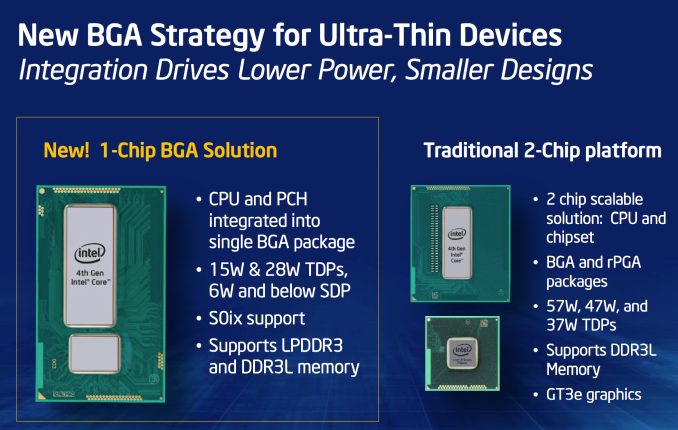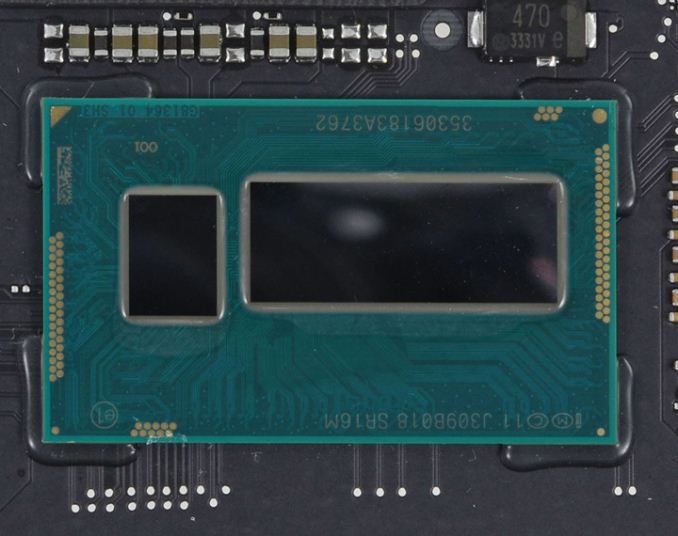The 2013 MacBook Air Review (13-inch)
by Anand Lal Shimpi on June 24, 2013 12:01 AM ESTThe CPUs
Apple keeps things simple across the 2013 MacBook Air lineup by configuring both 11 and 13-inch models with the same base CPU: a Core i5-4250U.
To understand Apple’s CPU choice, you have to understand that Apple is primarily concerned about improving battery life this generation. The line between MacBook Air and MacBook Pro has to be well defined. The Air is about portability, while the Pro is about performance. When faced with a power/performance tradeoff, it’s clear on which side of the fence Apple will fall whenever the MacBook Air is concerned.
| Apple 2013 MacBook Air CPU Comparison | |||||
| 1.3GHz dual-core | 1.7GHz dual-core | ||||
| Standard On | 11 & 13-inch MBA | Optional on Both | |||
| Intel Model | Core i5-4250U | Core i7-4650U | |||
| Base Clock Speed | 1.3GHz | 1.7GHz | |||
| Max SC Turbo | 2.6GHz | 3.3GHz | |||
| Max DC Turbo | 2.3GHz | 2.9GHz | |||
| L3 Cache | 3MB | 4MB | |||
| TSX-NI | No | Yes | |||
| TXT | No | Yes | |||
| AES-NI | Yes | Yes | |||
| VT-x/VT-x EPT | Yes | Yes | |||
| VT-d | Yes | Yes | |||
| TDP | 15W | 15W | |||
| Processor Graphics | Intel HD 5000 | Intel HD 5000 | |||
| GPU Clock (Base/Max) | 200/1000MHz | 200/1100MHz | |||
The lower base clock alone shouldn’t mean much, but the max TDP of the CPUs in the new MacBook Air falls as well - from 17W down to 15W. The thermal limit is even more dramatic since with Haswell ULT, the 15W includes the CPU/GPU as well as the on-package PCH. In Ivy Bridge the PCH was off package and wasn’t included in the 17W TDP.
Max turbo clocks are identical between the Haswell ULT CPUs Apple picked this round and the Ivy Bridge models before, but with a lower TDP it’ll be harder to always sustain the same frequencies given the right workload.
Haswell does feature a not insignificant gain in IPC compared to Ivy Bridge, which should help offset the power constraints that could otherwise force a larger regression in performance.
Both 2013 MBAs ship with the same CPU by default, and both can be upgraded to the same higher end SKU: a Core i7-4650U. The 4650U retains the same 15W TDP as the i5-4250U, but it increases its base clock speed to 1.7GHz and max turbo to 3.3GHz. The L3 cache also grows from 3MB to 4MB. All in all, this should be a very healthy upgrade in performance. Intel likely maintains the same TDP by binning for power; the i7-4650U is probably capable of running at higher frequencies without any appreciable increase in voltage. The max GPU clock also goes up by 10%.
Haswell ULT, Courtesy iFixit
What's arguably coolest about the i7-4650U is it enables Haswell's Transactional Synchronization Extensions (TSX-NI), a feature which is unfortunately disabled on the i5-4250U. I don't suspect this will matter much for most MBA users, but anyone looking to play around with Haswell's TSX instructions will want to opt for the higher end SKU. The upgrade costs $150 regardless of base model. Intel charges $454 for the i7-4650U and $342 for the i5-4250U, a difference of $112; Apple is adding another $38 onto the 1KU pricing, which isn't unreasonable.
Many have asked me what the impact of the i7 will be on battery life. I'm hoping to get my hands on an i7 based machine when I return from the UK in a week, but for those of you making immediate decisions I'll offer the following. Sustained operation at higher frequencies will likely draw more power, and negatively impact battery life. Light to medium workloads will enjoy a mix of race to sleep benefits as well as higher power consumption under load. Idle power should be roughly similar between the parts however. For most workloads I'd expect a modest impact to battery life, but it won't be enough to regress to 2012 levels of battery life. All of this is said without knowing key details like operating voltage for most 4650Us. I plan on addressing that shortly.












233 Comments
View All Comments
ananduser - Monday, June 24, 2013 - link
I believe this is the first time a company has actually released a slower product than the previous gen. On principle at least Apple should be penalized in the review.Anand may I suggest a battery testing feature ? Count the time it takes to finish one iteration of the looping test. Maybe the battery lasts longer on a certain device but it may also take longer to finish the task. After that "normalize" the results to really measure the improvement.
Paapaa125 - Monday, June 24, 2013 - link
MBA 2013-mid is not really that much slower. It has a lot faster SSD, it has a lot faster WLAN. CPU equal or slower than previous and GPU is faster than previous models. For most usages the net result is a equally fast if not faster computer. Mostly because SSD.captainBOB - Tuesday, June 25, 2013 - link
Instead of going the typical route and using all the extra power savings to increase performance while maintaining the same battery life of last year's model, Apple decided to increase battery life while maintaining performance with last year's model. Its an ultraportable.If you want more juice, get a Macbook Pro, the Macbook Air is all about the ultraportability.
As for the lack of 1080p, on all those other ultrabooks with a 1080p screen, the DPI scaling is upped to 150% by default because people were complaining that text on the screen was too small, Windows still can't handle DPI scaling very well, and I doubt Windows 8.1 will change things because it will most likely be an API and still be up to the developer to update their programs to support higher resolutions. Given the "stellar" track record of the Windows desktop development community and Microsoft itself in actually USING the awesome new APIs that Microsoft creates. The situation isn't going to change the moment 8.1 comes out, it may not change for several years.
Retina may be in the Air's future, but for now the Retina display is what clearly separates the Pro from the Air.
If there is one criticism that is valid, its that the display should've been at least IPS.
ananduser - Tuesday, June 25, 2013 - link
Spare me the marketing talk please...I never mentioned anything about the screen. Why do you feel the need to explain me Apple's motives for that ?They could have very well provided a 9 hour machine with a tangible increase in performance, but hey, Apple fans don't care, everything is perfect in camp Cupertino.
PS: Since you brought it up, the Windows desktop development community is pretty stellar indeed; it's why the best software on the planet, from virtually all categories you wish to name, is made to run on Windows first and foremost. Windows(the software) always handled scaling very well, and having options like 125% or 150% is pretty nifty. Since the display pissing contest just started it will take some time until devs start to obey proper guidelines.
Paapaa125 - Tuesday, June 25, 2013 - link
It's always a tradeoff. Apple went now for maximal battery life with acceptable performance. Most likely they'll focus on performance with rMBP. Sounds logical to me. I think there are many users to whom MBA has enough CPU power and they really need all day battery life. MBA now barely delivers that. Lower battery life would've meant that it will not last all day.ananduser - Wednesday, June 26, 2013 - link
So...we Anandtech readers... we who are the most pretentious of most users... can't we provide criticism ?jmmx - Monday, June 24, 2013 - link
What would like to know is this...I assume that turbo boost speeds will more likely occur when the unit is plugged in - i.e. it will not be draining the battery. Do any of these tests take this into account? (or did I jut not read far enough yet?)
Laststop311 - Monday, June 24, 2013 - link
I totally despise apple and yes it looks like they are making a lot of mistakes with the 2013 refresh. Staying with low res screens and lower clocked processors that are actually a nudge slower than in 2012. But with the the lower clock speeds and massive battery life improvements of the haswells the macbook air is poised to be the longest running ultrabook on battery this year, especially with the larger battery that adds no weight.When you combine the fact that this is haswell, they stayed with low res screens added a larger battery and lowered the cpu frequencies we are in for a real treat with an ultrabook with an insane battery runtime that still has enough power to do everything an ultrabook is used for 99% of the time and do it it with performance in the mid the to midhigh pack with Top battery scores. Not to mention the thermals are probably so much cooler on this air. If Apple left it at 50% would would or probably seen 15 hour idle numbers from apple. And once OSx integrates the power management optimizer feature from haswell those battery life numbers will only go up. Eve more.
I hate apple. But if battery life i you're #1 concern and want to routinely pull 10 hour workdays from your machine without charging the macbook air 13 model 2013 is the ultrabook for you.
KPOM - Thursday, June 27, 2013 - link
All notebooks are about design compromises. Apparently Apple decided to tweak this one for battery life rather than use Haswell as an opportunity to put in a faster processor or better screen. Hopefully they'll find a way to shave a few ounces off the weight of the 13" rMBP. I have one and like it, but miss the portability of the Air.Laststop311 - Monday, June 24, 2013 - link
I wish sata would just completely die off and intel increased in PCI lines by double 80X on enterprise 32x on consumer and have all new HDD and SSD connect via PCI 3.0 1GB/SEC bi directional. Can just use 1x lanes for all the storage devices maybe a few 2x lane connections for super high performance ssd;s. But probably won't see this wish till 2GB/sec bi directional pcie-e 4.0. Where we can easily stack up 8 SSD's on 1s lanes while still providing enough lanes for full GPU use. I hope pci 4.0 brings the full death of sata and its outdated ways. Even if we have to call it sata express. The Use of SATA needs to be fully dead by pci-e 4.0. Yea that includes even having to run a practically obsolete blu ray burners off a 1x line but who knows by then there may be a disc much puerior yo blu ray that can actually use the extra bandwidth. Would simplify computers no longer having to have all that data hardware on there too.